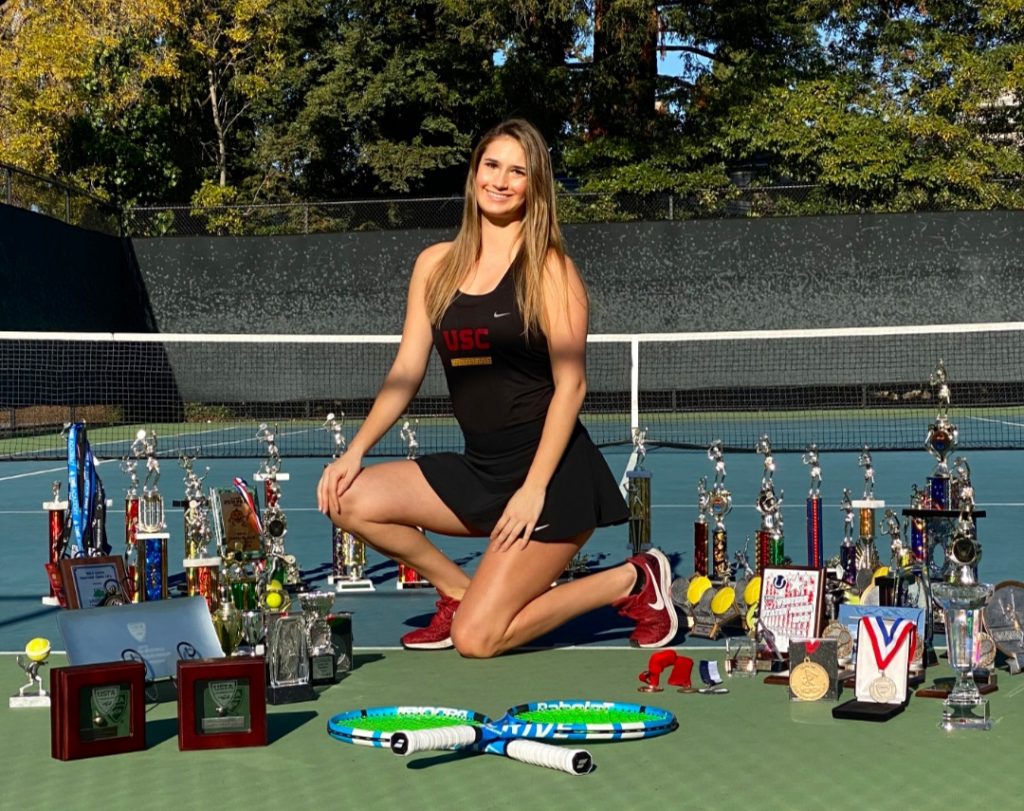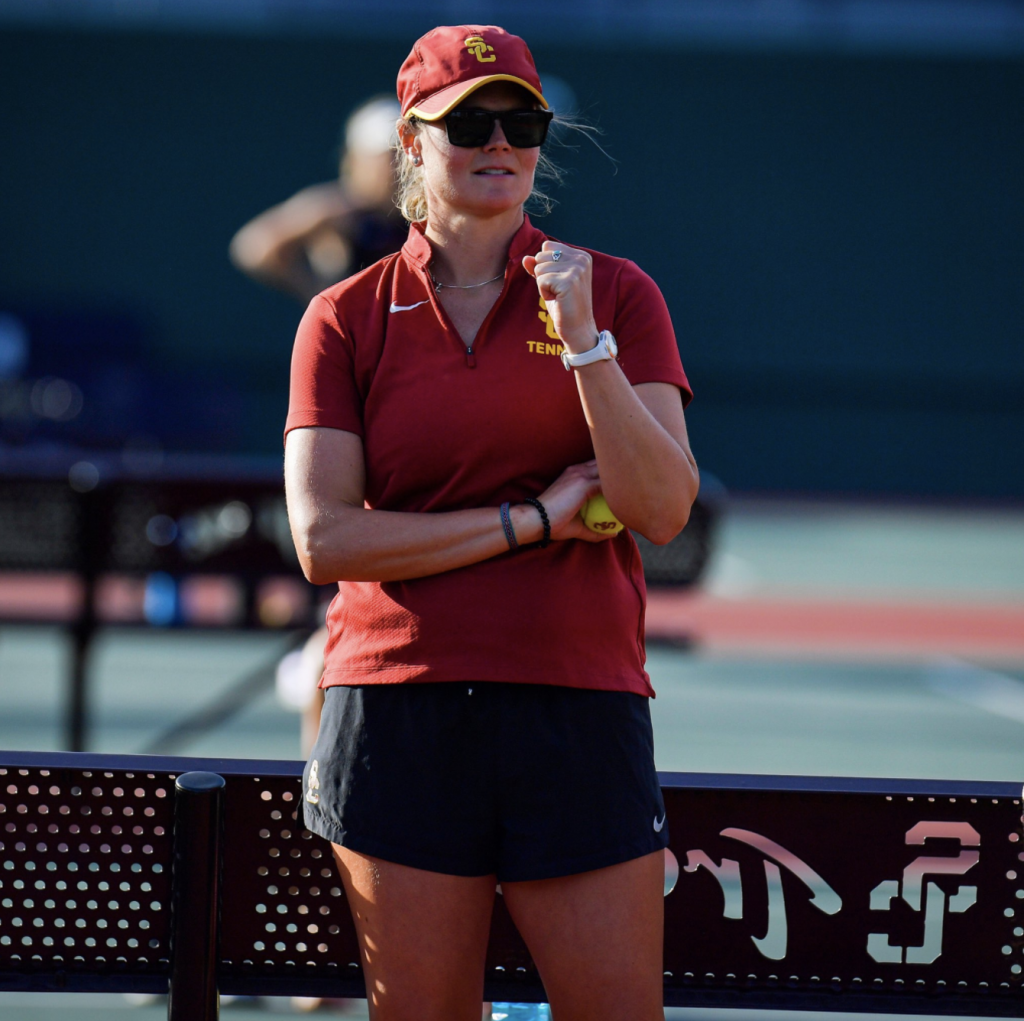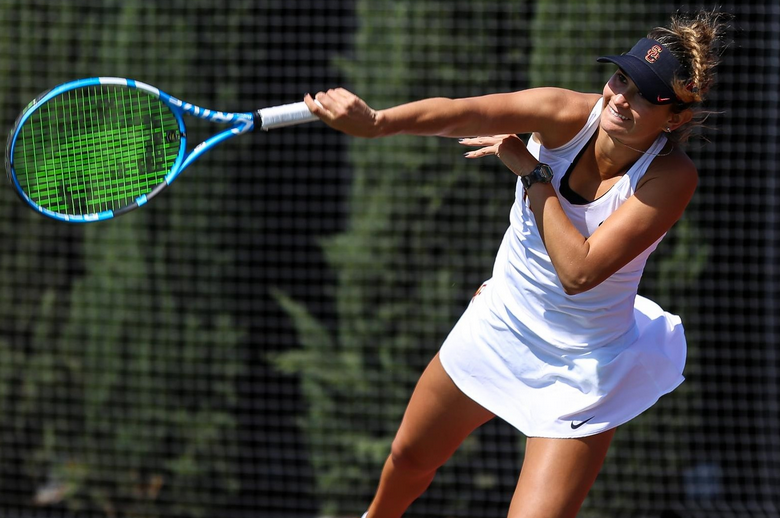Alexa Corcoleotes, a rising Northern California tennis star ranked 39th among U.S. high school players in 2017, won a coveted spot that same year on the USC tennis team, a perennial national powerhouse. There, she was joined by new coach Alison Swain, who had gaudy credentials of her own. Swain had coached Williams College for a decade, amassing a 224-28 record and winning several coaching honors, including the National Division Coach of the Year.
On paper, the combination of athletic talent and coaching acumen is the stuff of future championships.
But under Swain’s coaching, Corcoleotes’ mental health began to suffer: she began to experience anxiety, cried on a near daily basis, had panic attacks and found it difficult to get out of bed some days – hardly characteristic for a player accustomed to the pressures of being an elite athlete. And she wasn’t the only team member suffering. Two players transferred schools, citing concern for their own safety and a hostile environment as their reasons for leaving, according to legal documents submitted in 2019 to USC administrators on behalf of Corcoleotes and one of her teammates. The complaint details what they characterized as Swain’s abusive behaviors and asks for her removal. Over two years later, the university has yet to reach a decision in the case, Swain remains employed as the team’s coach and two more players are currently considering transferring, according to Corcoleotes.
Coach Swain declined to be interviewed, citing her busy schedule in the midst of the tennis season.

Corcoleotes’ experience is far from unique. She is not the first athlete to have her mental health negatively impacted by a coach. Nor is Swain the first coach to encounter complaints about her coaching style. While athletes’ relationships with their coaches are rarely publicly discussed, recent studies abound on the potential impact a coach can have on a student athlete. A 2018 study published by the Journal of Sport and Health Science found that 31% of male and 48% of female student athletes reported experiencing depression or anxiety every year of their college athletic career. While it’s hard to nail down an exact number, Academic Psychiatry published a study in 2015 that found that nearly 12% of college students had been diagnosed or treated for anxiety in the past year and that 7-9% reported being diagnosed or treated for depression. According to Psychology Today, research indicates that nearly 20% of university students deal with anxiety or depression. No matter which study you choose, the fact remains that student athletes experience significantly higher rates of depression and anxiety than their peers.
In addition, even well-intentioned coaches often do not know how to recognize warning signs of mental health issues in their athletes, or do not know how to best go about helping an athlete in need. A 2020 study by BMJ Open Sport and Exercise Medicine concluded that “supporting athlete mental health requires a cultural shift within sport, which includes recognising the importance of and varied ways in which to engage coaches in mental health promotion.”
When the relationship works
To be sure, not all athletes have troubled relationships with their coaches. With over 460,000 student athletes in the United States alone, according to the NCAA, and thousands of high school students aspiring to join their ranks each year, it would be presumptuous to conclude that the majority of them have negative experiences. Bridget Adams, a senior majoring in political science at the University of Minnesota, has experienced first-hand the difference a good coach can make for an athlete’s mental health. Adams started rowing at Minnesota Boat Club the summer before her freshman year of high school and immediately formed a bond with her coach, Miriam Baer.
“She basically was the first person who instilled in me that, like, I had the potential to be good at something, and was constantly making me feel like [rowing] was something I can be really successful at,” Adams reminisced.
Around the time she joined the team, Adams also began experiencing an uptick in her mental health struggles, which she can now identify as having started as early as the third grade. Without Adams having to say a word, Baer seemed to pick up on what she was going through and began to offer what Adams referred to as “unspoken courtesies” or things she wouldn’t offer a team member whom she believed to not be struggling.
“It was a very unspoken connection where she was like, ‘Okay you don’t have to show up consistently, because I know you’re struggling.’ And like, ‘I have to push you a little bit more because I see that potential,’” Adams recalled. “She would pick me up from school and bring me to practice so I wouldn’t have to take the bus and looking back it was all very unspoken. Like she knew that I was struggling, so in order to like help me with my mental health without, like, directly addressing it, she did so many little things for me that really helped. And yet, all while still pushing me to be a better athlete.”
Adams speculates Baer’s indirect methods of showing support likely stemmed from her age, as she grew up in a generation that typically does not speak openly about mental health. However, despite her potential discomfort with the topic, Baer provided Adams with an example of how supportive a coach can be in their athletes’ mental health journeys.
When the coach becomes the mental block
Nevertheless, if even one athlete has their mental health negatively impacted by a coach, that is still one athlete too many. Ashley Mullen, a senior at Vanderbilt University in Nashville, TN, first started doing gymnastics as a young child. After about seven years, she took a break from the sport before returning to the gym in the seventh grade. Although she was only attending practice for two hours a week, Mullen proved to be naturally talented and progressed quickly. Eventually, she convinced her parents to let her join a team at Gleason’s Gymnastics School in Eagan, MN, which increased her weekly practice from once a week, for two hours, to three days a week, for three hours at a time. She continued to progress at a rapid rate and within eight months had earned a spot on the advanced team.
Mullen’s love for the sport continued to grow until the middle of her freshman year of high school, when she experienced for the first time a mental block, or the inability to perform a skill previously performed with ease.
“That’s when my coach, Nikki, kind of started getting frustrated with me and she was just, like, giving me a lot of pressure,” Mullen recalled. “She’d say stuff like, ‘You need to get this done, you need to keep doing this.’”
Mullen eventually got past her mental block and began progressing quickly once again until she was one of the best, if not the best, gymnast on her team. However, she began to feel unfairly targeted by Nikki Schmidt and the gym’s owner, Larry Gleason.
While warming up before a competition in Houston, Mullen was shocked to overhear Gleason telling Schmidt that Mullen should be pulled from the meet as she was an “embarrassment” to the gym and would waste everyone’s time competing. While Mullen was ultimately allowed to compete that day, she was rattled and did not perform as well as she had hoped. Following this incident, Mullen felt self-doubt begin to creep in and began experiencing anxiety and panic attacks while at practice.
“I was like, my coaches don’t want me, the owner of my gym doesn’t want me anymore. Everything was kind of getting to me, and being a 15-year-old girl, that was not a healthy environment to be in by any means,” Mullen said.
Eventually, at the insistence of her parents, Mullen began seeing a sports psychologist, hoping to rediscover her love for the sport. Unfortunately, after being diagnosed with generalized anxiety disorder and two more years of continued incidents where she felt singled out by Schmidt and Gleason due to her mental health struggles, Mullen was forced to make the difficult decision to quit gymnastics for good.
“Even to this day, going back to the gym, like, gives me a lot of anxiety. And thinking about doing certain skills gives me anxiety because it just brings me back to that time in my life where I was, like, under so much stress and in such a toxic environment,” Mullen stated.
After quitting gymnastics, Mullen joined the lacrosse team at her high school and finally discovered what it was like to have coaches who were supportive and encouraging, rather than critical and derogatory.
“There was so much less pressure on me [on the lacrosse team.] My coaches didn’t expect me to be the best. They were, like, very willing to work with me and give me advice,” Mullen recalled. “When I wasn’t doing well in gymnastics, my coaches would criticize me, and they would be like, ‘You’re not allowed to compete, you’re going to get kicked off the team.’ None of that ever happened in lacrosse, they were just, like, ‘You try your best and you’re good.’ My [lacrosse] coaches believed in me and kept giving me compliments because they could see I was trying.”
While Mullen’s and Corcoleotes’ experiences show there is a long way to go until coaches universally recognize the impact they can have on their athletes, some coaches have dedicated their careers to bolstering their athletes’ confidence and self-image, while still pushing them to achieve high levels of performance.
When the athlete’s well-being comes first
Faith Johnson-Patterson, the former head coach of two Minnesota state championship high school girls basketball teams and current basketball head coach at Convent of the Visitation School, an all-girls Catholic school in Mendota Heights, MN, developed her coaching methodology by reflecting on her own experiences as a student athlete and how having a coach who didn’t believe in ability to go far affected her self-confidence for years to come.
“When you play a sport, you often find that people have scars from being a player or from being coached, and it tends to seem like they stay for a long time,” Johnson-Patterson said. “I’ve heard people that are a lot older always referencing back to the type of coach they had in high school. And it seems to me, that if people are still talking about their experience from years and years ago, that it really affects and impacts you throughout the rest of your life and the decisions that you make and how you view yourself.”
“I am not a coach that would ever give up on someone or limit someone, or tell someone what they’re not capable of. My job is to position kids to be as successful as possible, my job is to give them all the tools, you know, and prepare them as best possible, and not to be that person to get in their way, or say, ‘You know what, no, I don’t think you can,’ Johnson-Patterson continued. “I mean, my name is Faith. Faith! I mean, with a name like that, it doesn’t even match up not to believe in somebody.”
Johnson-Patterson is the first to admit she’s made mistakes. However, she differs from many of her peers in that she’s not afraid to admit when she’s wrong and to apologize to her athletes.
“I’m accountable. Whenever I personally make a mistake or something, I’m going to go back and I’m gonna have a discussion. So everybody understands, it’s just like any relationship: you have to have open communication. [Your athletes] have to feel like they can come to you and that you guys can discuss things without any repercussions,” Johnson-Patterson said.
Johnson-Patterson spends a long time establishing relationships with her athletes in order to help her teams trust in themselves and in her as their coach. This past season marked her first year coaching at Visitation, and she dedicated the majority of the season to building trust and getting to know her athletes.
“Overall, I’m a very intense coach, I really am. But, I’m only intense and super competitive, after my kids understand and know that I love them first, and I care about them. And that it’s not so much about winning, it’s about them. I want to win, but not at the cost of them,” Johnson-Patterson mused.
Monique Javer-Dias, a tennis coach in northern California and Corcoleotes’ coach from the ages of 15-18, also believes that getting to know her athletes on a personal level is vital in helping them succeed.
“Everyone’s different, no one’s the same and so a relationship with a coach is very tricky. So, when I work with my students, I take the approach of, ‘Hey if you’re going to be really good, it’s gonna take work but I’m not going to be, you know, screaming and yelling at you, I’m going to try to understand you,’” Javer-Dias said. “Part of being a coach is listening to the player, like, you can’t be up on your game, every single day, day in and day out.”
As a former pro-tennis player, Javer-Dias has had personal experience training under a variety of coaching styles, which helped to inform her approach towards coaching.
“As a coach, because I was a player, I know all the different personalities, so, to get the best out of somebody, you’ve got to make them feel like they want to give you their best, you know what I mean?” Javer-Dias queried.
Corcoleotes echoed Javer-Dias’ assessment of her coaching style, speculating:
I think because [Monique’s] an ex-pro tennis player, she actually understands the difference between a good coach and a bad coach because she’s had both as well. So, she understood if I was having a bad day, we would maybe taper off on practice, or if I was feeling really good, then we would go really intense. She also was going through treatment for breast cancer while coaching me, which I honestly think probably brought us closer together and created more of a personal bond, which is extremely important between the player and coach.
Both Johnson-Patterson and Javer-Dias serve as examples of coaches who are able to get the results they want out of their players, while still prioritizing their athletes’ mental and physical health and recognizing the role they have as coaches in shaping their athletes’ futures.
“At the end of the day, we’re here to help kids be successful and shape and form their life. So, a good coach is able to do that, able to instill some things in [their athletes] that will build them up and make them feel like they’re able to do anything, like they can do anything,” Johnson-Patterson concluded.
As for Corcoleotes, things eventually came to a head in February 2019, when Swain called Corcoleotes in for a series of meetings during which Corcoleotes was told she was “a detriment to the team” and accused of creating drama, although Swain could provide no examples of what Corcoleotes had done wrong. Swain also threatened to kick Corcoleotes off the team if she did not write what the legal documents refer to as a “Compliant False Confession.” According to The Journal of the American Academy of Psychiatry and Law, a compliant false confession is “one given in response … [to] coercion, stress, or pressure to achieve some instrumental benefit … they are made knowingly: the suspect admits guilt with the knowledge that he is innocent and that what he says is false.” While Corcoleotes agreed to write the required letter, apologizing for miscommunication and offensive and derogatory remarks, she was terminated from the team three days later, once again throwing her mental health into a tailspin.
Corcoleotes’ case against Coach Swain is still under investigation, although an initial response from the University of Southern California found that:
…There was insufficient evidence to indicate that Swain violated University policy by engaging in an ongoing pattern of harassing and/or belittling behavior of members of the Women’s Tennis team, by making comments or taking actions that the team members considered to be verbally abusive and humiliating, and by causing the team members to feel fearful.

The University is expected to make a final decision regarding Swain’s employment at USC in the coming months.

Hi, this is a comment.
To get started with moderating, editing, and deleting comments, please visit the Comments screen in the dashboard.
Commenter avatars come from Gravatar.